|

 |
|
|
.jpg) |
.jpg) |
| follow the links on the left |
|
.jpg) |
.jpg) |
|
The National Railway Museum (NRM)
is a
museum in
York forming part of the
British
National Museum of Science and
Industry and telling the story
of
rail transport in Britain and
its impact on society. It has won
many awards including European
Museum of the Year in 2001. It is
the home of the National Collection
of historically significant railway
vehicles and other artefacts. |
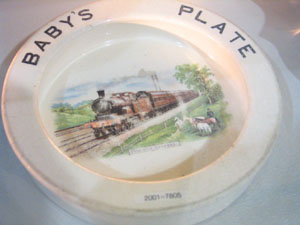 |
.jpg) |
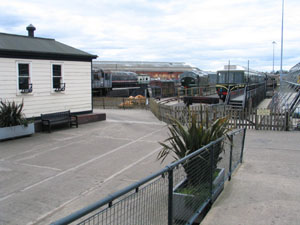 |
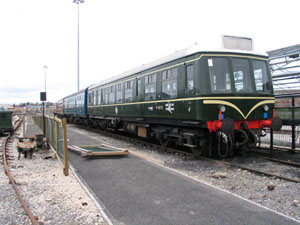 |
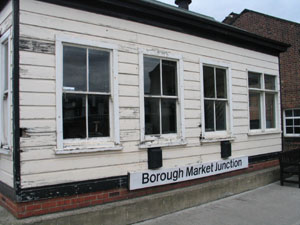 |
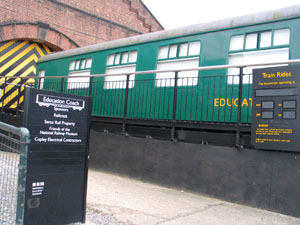 |
| Above - outside areas |
below - Interactive Learning
Area |
.jpg) |
.jpg) |
The NRM in York displays a
collection of over 100 locomotives
and nearly 200 other items of
rolling stock, virtually all of
which either ran on the railways of
Great Britain or were built there.
Also on the 20 acre (8 hectare) site
are many hundreds of thousands of
other items of social, technical,
artistic and historical interest,
exhibited mostly in three large
halls of a former motive power depot
next to the East Coast Main Line,
near York railway station. It is the
largest museum of its type in the
world. It also has more visitors
than any other British museum
outside London.
The NRM was established on its
present site, the former York North
locomotive depot, in 1975, when it
took over the former British
Railways collection located in
Clapham and the York Railway Museum
located elsewhere in the city; since
then, the collection has continued
to grow. |
.jpg) |
.jpg) |
The museum is a short walk from the
railway station in York, either on
the road or via a staircase from the
rear of the platforms. A "roadtrain"
runs from the city centre (near York
Minster) to the museum on Leeman
Road. York Park and Ride also serve
the museum from the car park
entrance, on Line 2 (Rawcliffe
Bar-York). Admission to the museum
has been free for a number of years.
It is open daily from 10am to 6pm.
Locomotion – the National Railway
Museum in Shildon, County Durham was
opened in 2004 and is operated by
the NRM in conjunction with
Sedgefield Borough Council. It
houses more of the National
Collection in a new building and a
historic site around the former
workshop of Timothy Hackworth and
attracts a further 100,000 visitors
annually. |
.jpg) |
.jpg) |
The museum was opened by Prince
Philip, Duke of Edinburgh in 1975.
The opening coincided with the 150th
anniversary celebrations of the
opening of the Stockton & Darlington
Railway, for which several working
exhibits were provided. By
comparison with the museum’s
predecessors coverage of ordinary
passenger coaches and non-steam
motive power was enhanced, but a
popular new exhibit was ex-Southern
Railway Merchant Navy Class No.
35029 Ellerman Lines sectioned to
show the workings of a steam
locomotive. The new museum received
over a million visitors in its first
year and was favourably received by
critics.
Significant events of 1979 were the
restoration of a train of
appropriate vehicles to mark the
centenary of on-train catering and
an exhibition to mark the centenary
of railway electric traction which
drew attention to the museum's
important collections in this area.
Also in 1979 the museum commissioned
a working replica of Stephenson's
Rocket for the following year’s
Liverpool and Manchester Railway
150th anniversary. This has since
represented the museum at events
around the world.
Another working replica was added to
the collection for the 150th
anniversary of establishment of the
Great Western Railway in 1985: that
of the 7 ft 0¼ in (2140 mm) Broad
Gauge locomotive Iron Duke.
Concerns about the condition of the
concrete roof structure on the main
building brought forward major
changes to the museum in 1990. To
maintain a presence at York, the
former York goods depot across
Leeman Road, already in use as a
museum store (the Peter Allen
Building), was configured to display
trains as if in a passenger station,
and this together with the adjacent
South Yard was marketed as The Great
Railway Show. A further selection of
exhibits formed the National Railway
Museum on Tour on display for a
season in the former Swindon Works.
Meanwhile, the main building was
completely re-roofed and
reconstructed retaining only one of
the two original 1954 turntables. It
was reopened in 1992 as the Great
Hall giving enhanced opportunities
to display large artefacts such as
railway signals, a footbridge and a
segment from the Channel Tunnel. The
former goods shed display was
retained as the Station Hall.
In 1995 the museum joined forces
with the University of York to
create an academic research base,
the Institute of Railway Studies
(and Transport History). It has also
since partnered with York College to
create the Yorkshire Rail Academy to
teach vocational skills. The museum
has also provided engineering
apprenticeships and participates in
partnerships aimed at delivering
heritage skills training.
In 1996 the Museum Garden was
created incorporating a 7¼ in (184
mm) gauge ridable miniature railway.
Continued concern over the condition
of the remaining 1950s buildings on
the site led to their replacement by
The Works in 1999. This gave several
functional areas: the Workshop, for
maintenance of rolling stock; the
Workshop Gallery, from which the
public can look down on this work; a
Working Railway Gallery, giving an
insight into current and recent
operation including a balcony
overlooking York railway station
hosting a set of monitors showing
live feeds from the monitors at York
IECC; and the Warehouse which
provides an innovative open storage
area which has proved popular with
both public and museum
professionals. |
|
|
|
[ Home ] [ Up one level ] [ Great Hall ] [ National Railway Museum ] [ Station Hall ] [ The Works ] |
|
|